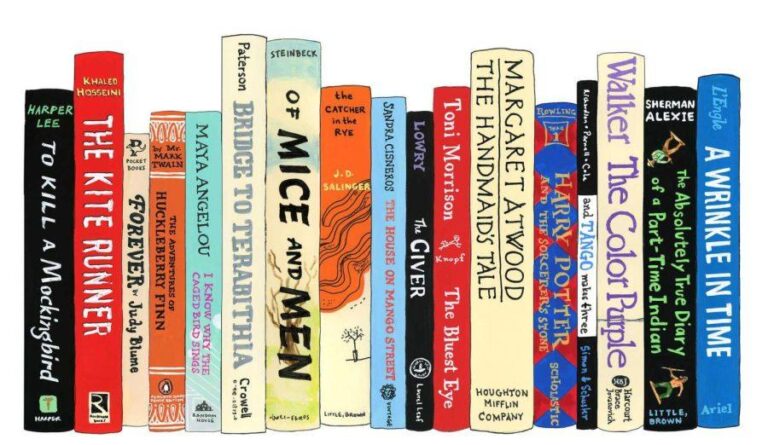Escalating Book Bans in U.S. Schools: A Growing Challenge to Educational Diversity and Freedom
Legislative Crackdowns on Diverse Educational Content in Republican-Led States
In recent years, numerous Republican-controlled states have enacted laws that sharply limit the availability of certain books in public school libraries and classrooms. These restrictions predominantly affect works that explore racial history, LGBTQ+ experiences, and social justice themes, often under the pretext of shielding students from “age-inappropriate” material. Critics argue that such policies disproportionately silence marginalized voices and hinder students’ ability to engage with complex societal issues through critical thinking.
Schools are increasingly pressured to remove or avoid including a wide range of literature,resulting in a stifled academic environment. This trend has ignited contentious discussions among educators,parents,policymakers,and civil rights advocates. Key elements fueling this surge in book bans include:
- Targeted Legislation: Laws explicitly banning books or topics deemed controversial or sensitive.
- Heightened Oversight: Stricter monitoring of library collections and classroom materials.
- Community Divisions: Growing polarization among school boards, parents, and local stakeholders.
- Legal Disputes: An increase in lawsuits challenging the constitutionality and educational impact of these bans.
| State | Number of Banned Books | Primary Themes Targeted |
|---|---|---|
| Texas | 120+ | Race, Gender Identity |
| Florida | 80+ | LGBTQ+, Social Justice |
| Georgia | 45+ | Critical Race Theory |
| Idaho | 30+ | Diverse Histories |
Consequences for Students and Educators: Academic Freedom Under Threat
The tightening restrictions on educational content have generated notable concern among teachers and students alike. Many educators report feeling compelled to self-censor to avoid administrative penalties or community backlash, which narrows the breadth of classroom discussions. Students, especially those from underrepresented backgrounds, frequently enough find themselves deprived of literature that reflects their identities or challenges dominant cultural narratives, undermining their educational engagement and personal development.
Some of the notable repercussions include:
- Stifled Intellectual Curiosity: Limited access to diverse reading materials curtails students’ ability to think critically and explore new ideas.
- Increased Educator Stress: Teachers navigate unclear policies and heightened scrutiny, leading to anxiety and burnout.
- Widening Educational Inequities: Restrictions are more prevalent in Republican-led states, exacerbating disparities in learning opportunities nationwide.
| Reported Impact | Percentage of Educators Reporting | Frequency |
|---|---|---|
| Self-censorship by teachers | 75% | Weekly |
| Student complaints about limited book availability | 68% | Monthly |
| Heightened classroom tensions | 53% | Ongoing |
Legal Challenges Mount Against Restrictive Educational Policies
In response to these sweeping bans, several civil rights and educational advocacy organizations have launched legal actions against state governments. These lawsuits contend that the laws violate First Amendment protections by censoring access to details and infringe upon students’ right to a complete education. Legal experts emphasize that the vague wording in many statutes risks arbitrary enforcement, creating a climate of fear among educators and librarians who may avoid controversial materials to evade penalties.
Central arguments in these legal battles include:
- Ambiguity: Broad and unclear definitions of prohibited content lead to inconsistent request.
- Discriminatory Effects: Many bans disproportionately target books featuring marginalized communities.
- Free Speech Violations: Restrictions impede constitutional rights to access diverse viewpoints.
- Educational Harm: Experts warn of negative impacts on students’ critical thinking and empathy development.
| State | Legislation Status | Litigation Status | Advocacy Organization |
|---|---|---|---|
| Texas | Enacted | Pending | American Library Association (ALA) |
| Florida | Enacted | Filed | American Civil Liberties Union (ACLU) |
| Arizona | Proposed | Pre-litigation | National Association for the Advancement of Colored People (NAACP) |
Proactive Approaches for Schools and Communities to Uphold Inclusive Education
To counteract the growing wave of censorship, schools and communities must foster open dialogue and resilience. Building partnerships among educators, parents, and local leaders can create transparent processes for curriculum decisions, reducing the impulse to ban materials outright. Establishing community advisory committees offers a platform to address concerns collaboratively and maintain diverse educational content.
Incorporating critical media literacy into teaching equips students with the skills to evaluate and question information independently, preparing them to engage thoughtfully with challenging topics. Additionally, advocacy groups and school districts are utilizing legal avenues and policy reforms to defend intellectual freedom and promote diverse learning resources. Creating networks for sharing digital and physical materials across districts helps preserve access to a wide range of perspectives despite localized restrictions.
| Strategy | Practical Example |
|---|---|
| Community Involvement | Hosting public forums to discuss curriculum choices |
| Legal Support | Collaborating with organizations like the ACLU for litigation |
| Resource Sharing | Developing inter-district digital libraries with diverse content |
| Professional Development | Conducting workshops on culturally responsive teaching methods |
| Student Engagement | Facilitating student-led book clubs and open discussions |
Conclusion: Navigating the Future of Educational Content Amid Political Divides
As book bans continue to proliferate in Republican-led states,the conflict over educational content and intellectual freedom intensifies. Proponents argue these laws protect children from unsuitable material, while opponents warn they threaten the diversity of ideas essential for a comprehensive education. With ongoing legal challenges and deeply divided communities, the future landscape of school libraries and curricula remains uncertain, shaped increasingly by political ideologies rather than educational priorities.




